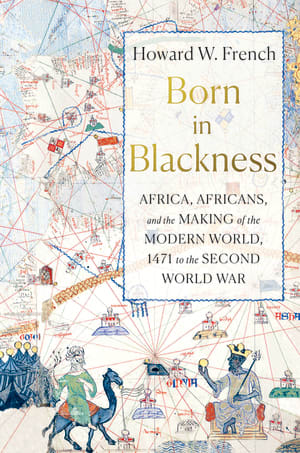Conversation with MAAH Stone Book Award Winner Howard W. French — Born in Blackness
Friday, Oct 14, 2022 3:00p -
4:30p
Where:
Online event
Admission:
FREE
Categories:
History, Lectures & Conferences, Social Good, Virtual
Event website:
https://bpl.bibliocommons.com/events/631f8694273a91a3a1b9a0fb
Revealing the central yet intentionally obliterated role of Africa in the creation of modernity, Born in Blackness vitally reframes our understanding of world history.
Winner of the Museum of African American History 2022 Stone Book Award Howard W. French will discuss his winning book Born in Blackness: Africa, Africans, and the Making of the Modern World, 1471 to the Second World War with Boston Public Library President David Leonard.
Following the conversation, there will be an audience Q&A.
To attend, please register on this Zoom webinar link: https://boston-public-library.zoom.us/webinar/register/WN_pRzqO6xoSDSTugL7Z8h0ZA.
More about the book
Traditional accounts of the making of the modern world afford a place of primacy to European history. Some credit the fifteenth-century Age of Discovery and the maritime connection it established between West and East; others the accidental unearthing of the “New World.” Still others point to the development of the scientific method, or the spread of Judeo-Christian beliefs; and so on, ad infinitum. The history of Africa, by contrast, has long been relegated to the remote outskirts of our global story. What if, instead, we put Africa and Africans at the very center of our thinking about the origins of modernity?
In a sweeping narrative spanning more than six centuries, Howard W. French does just that, for Born in Blackness vitally reframes the story of medieval and emerging Africa, demonstrating how the economic ascendancy of Europe, the anchoring of democracy in the West, and the fulfillment of so-called Enlightenment ideals all grew out of Europe’s dehumanizing engagement with the “dark” continent. In fact, French reveals, the first impetus for the Age of Discovery was not—as we are so often told, even today—Europe’s yearning for ties with Asia, but rather its centuries-old desire to forge a trade in gold with legendarily rich Black societies sequestered away in the heart of West Africa.
Creating a historical narrative that begins with the commencement of commercial relations between Portugal and Africa in the fifteenth century and ends with the onset of World War II, Born in Blackness interweaves precise historical detail with poignant, personal reportage. In so doing, it dramatically retrieves the lives of major African historical figures, from the unimaginably rich medieval emperors who traded with the Near East and beyond, to the Kongo sovereigns who heroically battled seventeenth-century European powers, to the ex-slaves who liberated Haitians from bondage and profoundly altered the course of American history.
While French cogently demonstrates the centrality of Africa to the rise of the modern world, Born in Blackness becomes, at the same time, a far more significant narrative, one that reveals a long-concealed history of trivialization and, more often, elision in depictions of African history throughout the last five hundred years. As French shows, the achievements of sovereign African nations and their now-far-flung peoples have time and again been etiolated and deliberately erased from modern history. As the West ascended, their stories—siloed and piecemeal—were swept into secluded corners, thus setting the stage for the hagiographic “rise of the West” theories that have endured to this day.
“Capacious and compelling” (Laurent Dubois), Born in Blackness is epic history on the grand scale. In the lofty tradition of bold, revisionist narratives, it reframes the story of gold and tobacco, sugar and cotton—and of the greatest “commodity” of them all, the twelve million people who were brought in chains from Africa to the “New World,” whose reclaimed lives shed a harsh light on our present world.
Patrons may purchase the book online from Frugal Bookstore by visiting this link.
About the author
Howard W. French is a professor of journalism at Columbia University and a former New York Times bureau chief for the Caribbean and Central America, West and Central Africa, Tokyo, and Shanghai. The author of five books, French lives in New York City.
The Museum of African American History (MAAH) Stone Book Award is an annual prize that encourages scholarship and writing within the field of African American history and culture by awarding a $50,000 winning prize and two $10,000 finalist prizes for exceptional adult non-fiction books written in a literary style.
-

SponsoredAffordable Spanish Classes in Boston (in-person and online courses) | BASE
Monday, May 05, 2025 goes until 05/18
Boston Area Spanish Exchange (BASE)


